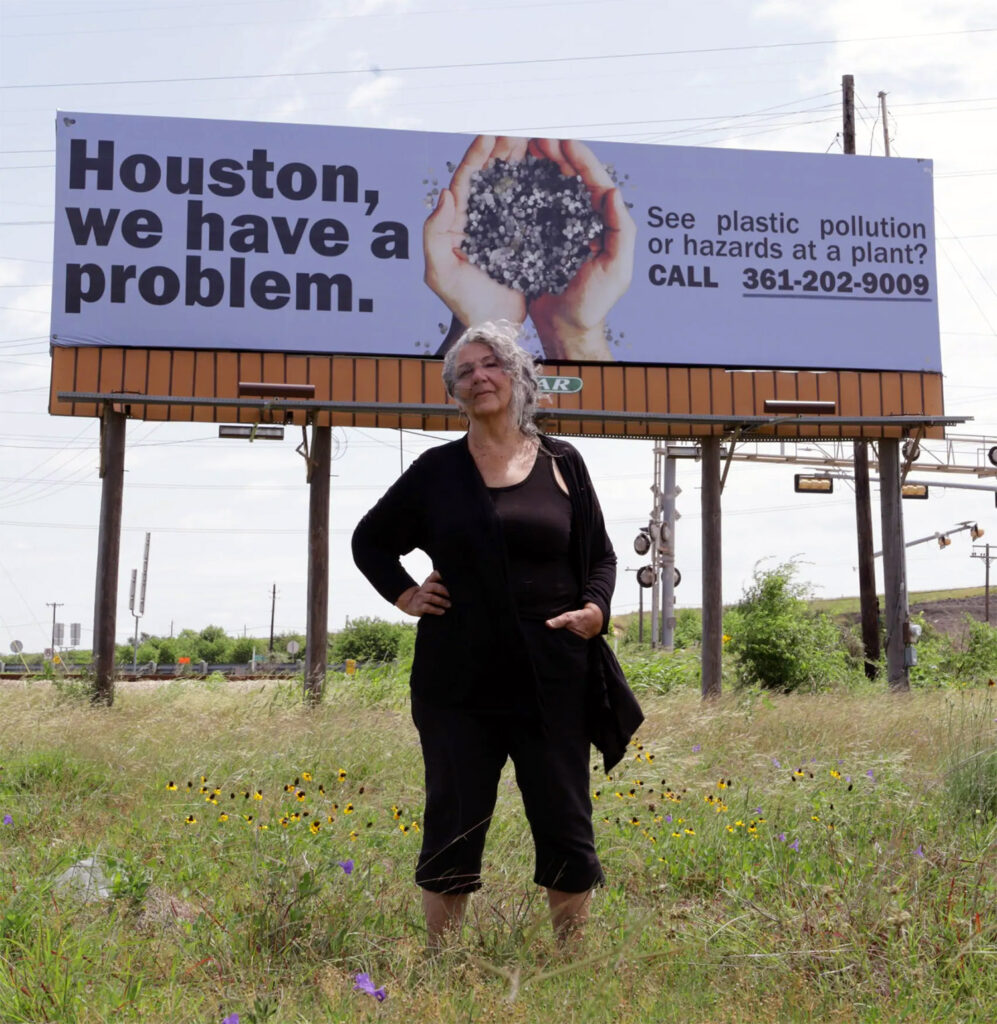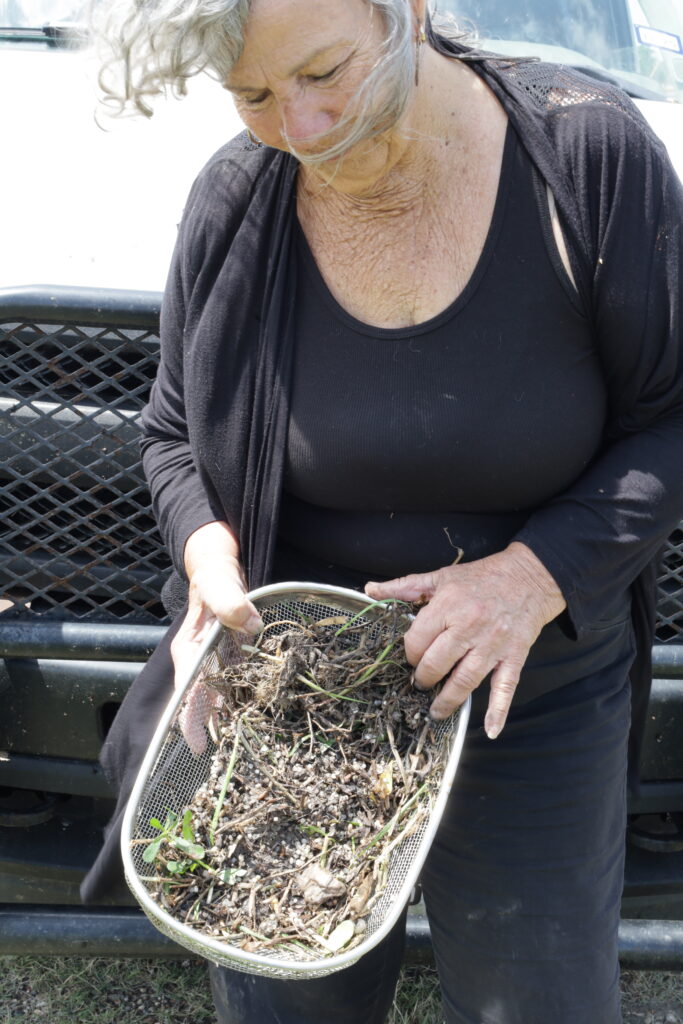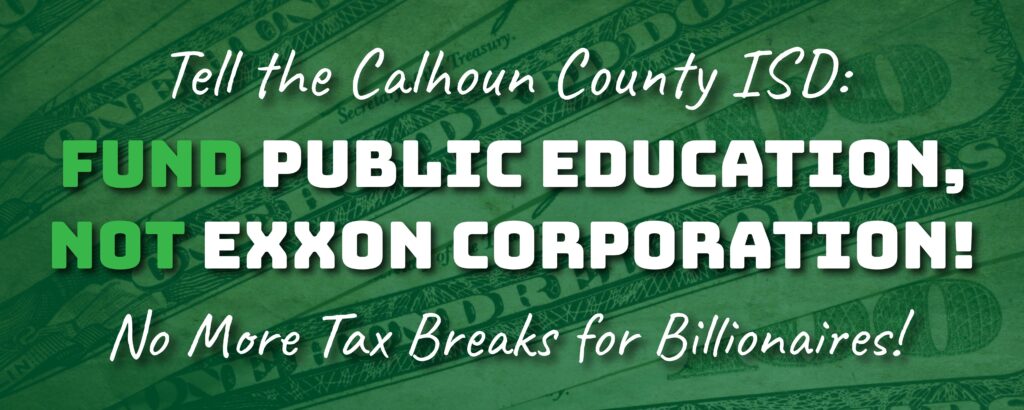|
Getting your Trinity Audio player ready...
|
A local school district on the Texas coast is in hot water for advancing ExxonMobil’s request for a $242 million tax break for their proposed plastics plant—without properly notifying the public.
San Antonio Bay Estuarine Waterkeeper, a long time partner of Earthworks, filed a legal challenge against the Calhoun County Independence School District after they discovered the school board buried the notice in an obscure section of their website for only 14 days before the meeting—not the required 15 days. When Waterkeeper’s Executive Director Diane Wilson called the school board to confirm if the tax break was on the agenda, they said it was not, and then proceeded to schedule a special meeting for Exxon’s tax break application that same day. They never bothered to tell Wilson any different.
“This wasn’t just a flaw in the process,” Wilson said. “We feel it was a deliberate attempt to avoid public opposition to Exxon’s $242 million tax abatement.”

Manufacturing and fossil fuel companies in Texas can apply for a limit on the taxable value of their property that they have to pay to school districts on certain projects. In exchange, the company’s project is supposed to create jobs and stimulate the economy, though actual job creation requirements range from 10-75 per year for the duration of the abatement. Exxon claims their project would create 300 permanent jobs, but the company has not always kept its promises to be good for the environment or the local community. In San Patricio County, for example, a chemical plant jointly operated by ExxonMobil called Gulf Coast Growth Ventures received $500 million in local property tax breaks. In addition to releasing a half million pounds of illegal air pollution, the company created only around half of the jobs initially promised.
“This wasn’t just a flaw in the process. We feel it was a deliberate attempt to avoid public opposition to Exxon’s $242 million tax abatement.”
When big companies get tax breaks, they don’t have to pay as much money to the city or school district. This means there’s less money to pay for important things like schools, parks, roads, and firefighters. Sometimes, residents have to pay more taxes to make up for it. Companies say they will bring jobs or help the community, but they don’t always keep those promises. These deals are often made in secret, so local people don’t get a say, even though it affects them.
San Antonio Bay Waterkeeper is monitoring Exxon’s project proposal because the plant would be located on Cox Creek, which flows into Matagorda Bay, an important recreational and commercial fishing area that has already seen decades of plastic pollution from Formosa Plastics. This includes Matagorda Bay Fishing Cooperative’s 60-acre oyster farm development, the largest in Texas. Candy Bribiesca, the Community Outreach Specialist for the Cooperative, said many fishers work long hours on the water and need fair notice to participate in these critical meetings.
“The proposed ExxonMobil plant would be built near Keller Bay, where we’re developing one of the largest oyster farms in Texas, which is crucial to revitalizing our fishing industry,” Bribiesca said. “This facility could pollute our water and undermine years of work to restore our bay’s ecosystem.”

The cooperative, which represents over 240 local fishing industry workers who are investing millions in sustainable seafood production as an alternative to local industrial development, was formed in February 2024 with funds won from Wilson’s historic $50 million Clean Water Act settlement against Formosa Plastics in 2019. As a fourth generation shrimp boat captain, Wilson has seen firsthand how oil, gas, and petrochemical industries are destroying a once lively fishing industry from their pollution—and holding them accountable.
Cox Creek is currently undergoing a massive cleanup effort to remove billions of tiny plastic pellets illegally discharged into the environment by Formosa Plastics’ Point Comfort facility, which is one of the largest chemical plants in the country and is located less than a mile from the location of Exxon’s proposed plant. The cleanup project has a price tag of $50 million at completion. According to the consent decree, in addition to the $50 million settlement, Formosa must pay for the plastic cleanup of Cox Creek and Matagorda Bay, which will begin in 2026.
“I once said that my one big environmental regret was not trying hard enough to stop Formosa Plastic from coming into Calhoun County,” Wilson said. “I won’t have that regret this time.”

